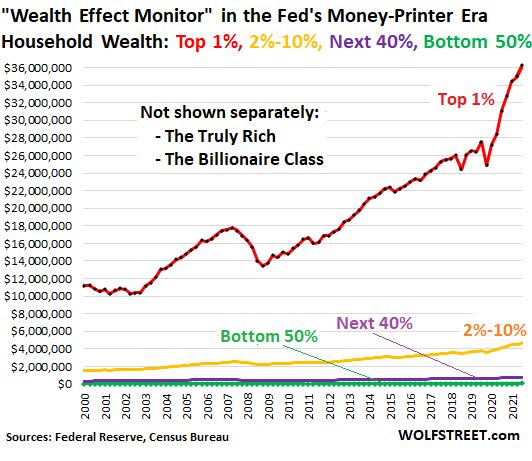The concept of the wealth effect is an important factor influencing the behavior of consumers and the overall health of an economy. It refers to the impact that changes in the value of assets, such as housing or stock market investments, have on an individual’s perception of their wealth and subsequent spending habits. Let’s explore the wealth effect in more detail and understand its implications.

Credit: wolfstreet.com
Table of Contents
How Does the Wealth Effect Work?
When individuals see an increase in the value of their assets, they tend to perceive themselves as wealthier. This perception often leads to increased confidence in their financial situation, prompting them to spend more. The wealth effect is based on the assumption that people view their wealth as a reflection of their future income and use it to determine their levels of consumption.
For example, if the value of a person’s investment portfolio rises significantly, they might feel more confident in making large purchases, such as a new car or home renovations. This increased spending, in turn, stimulates economic growth as businesses experience higher demand and revenue.
The Wealth Effect and Consumer Spending
Consumer spending plays a significant role in driving economic growth. When individuals feel financially secure due to an increase in their wealth, they are more likely to engage in discretionary spending. This spending ranges from luxury items to leisure activities and dining out.
However, it’s important to note that the magnitude of the wealth effect varies among individuals. High-income households, with a large proportion of their wealth invested in assets like stocks and real estate, generally experience a more pronounced wealth effect. On the other hand, lower-income households, whose wealth is primarily derived from income, may have a lesser impact from changes in asset values.
Credit: fastercapital.com
Implications of the Wealth Effect on the Economy
The wealth effect can have a significant impact on the overall health of the economy. When there is a positive wealth effect, consumer spending increases, leading to greater demand for goods and services. This, in turn, stimulates business investment and job creation.
Conversely, a negative wealth effect can occur when there is a decrease in the value of assets, causing individuals to feel less wealthy. This reduction in perceived wealth can lead to a decrease in consumer spending, resulting in lower demand and potential economic slowdown.
Understanding the wealth effect is crucial for policymakers and economists as they evaluate the state of the economy and make decisions regarding monetary policy. By monitoring changes in asset values and analyzing the subsequent impact on consumer behavior, they can better anticipate potential economic trends.
Examples of the Wealth Effect
Historically, we can observe instances where the wealth effect has influenced the economy:
- Dot-Com Bubble (late 1990s): During the dot-com bubble, stock prices in the technology sector experienced a significant increase. This surge in wealth led to increased consumer spending, contributing to economic growth.
- Global Financial Crisis (2007-2008): The collapse of the housing market and stock prices during the financial crisis caused a negative wealth effect. As people’s perceived wealth decreased, consumer spending declined, exacerbating the economic downturn.
- Pandemic-induced Stock Market Surge (2020): Despite the economic challenges brought by the COVID-19 pandemic, the stock market experienced a surge. This increase in asset values contributed to the wealth effect and supported consumer spending.
Conclusion
The wealth effect is a fundamental concept in understanding consumer spending and its impact on the economy. Changes in asset values can greatly influence an individual’s perception of wealth, leading to a corresponding adjustment in their spending habits. Policymakers and economists closely monitor these effects to gain insights into economic behaviors and make informed decisions. Whether positive or negative, the wealth effect is an important driver of economic growth and stability.